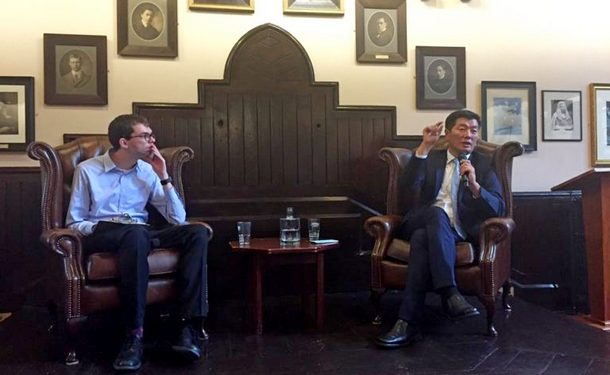London, UK — Dr Lobsang Sangay, President of the Tibetan-government-in-exile, officially known as Central Tibetan Administration (CTA) visited the Cambridge Union this week and the Speakers Officer at The Cambridge Union sat down with him to talk about a wide scope of agenda including the "Middle Way Approach", climate change, and the future of Tibet.
The President arrived in the United Kingdom on June and on his arriving at Heathrow airport in the capital of Great Britain London he was welcomed by Representative Sonam T Frasi and the Tibetan community.
The Tibetan leader started his program with his talk on Wednesday at the prestigious Cambridge Union – the oldest debating society in the world and the largest student society in Cambridge, according to the Office of Tibet, London.
Speaking on The future of Tibet – its importance to Asia and the world the President dealt with the subject from four different angles: Tibet’s importance ideologically, environmentally, geopolitically & spiritually.
Dr Sangay mentioned that the rise of nationalism together with economic growth has fuelled an arms race in Asia, and reasoned that if the arms were to be used in future, Tibet due to its strategic location between two Asian giants, could be a potential flashpoint.
Referencing from scientific findings and research, the President explained that the permafrost thawing in Tibet, also referred to as ‘Third Pole’ (home to the largest store of fresh water outside Arctic and Antartic), could exacerbate global warming by releasing methane and other hydrocarbons into the atmosphere.
The Tibetan political leader stressed home the importance of studying Tibet’s environment to fully understand global warming and climate change. On the spiritual front, he touched on mindfulness – a topic of great interest in the West – and noted that the Buddha’s teachings and the commentaries on his teachings encompass the subject in its entirety and has huge potential to benefit mankind.
In concluding his talk, the President referred to the Middle Way Approach as the pragmatic solution to the Tibet issue, reasoning that this solution would help alleviate the ongoing repression and suffering of the Tibetans inside Tibet, while not seeking total independence and separation from the People’s Republic of China.
President of the Tibetan-government-in-exile further explained that the genuine autonomy that the exile administration seeks is already guaranteed in the Chinese constitution.
His talk was followed by an interactive question and answer session, where questions ranged from the set-up of the Tibetan exile administration, the role of His Holiness the Dalai Lama in the Tibet movement, to questions about the challenges the Sikyong faces especially on his political activities and how the West can help the Tibet issue.
In his replies to the queries the Sikyong mentioned about the robust democracy that was being practiced in exile, about how through foresight and vision His Holiness the 14th Dalai Lama separated the church and the state wherein the President handles all political responsibilities, about the literacy rate of Tibetan exile population which stands at a staggering 94%.
Dr Sangay pointed to attempts by Chinese authorities at reaching out to political leaders in the countries he visits and asking them to refrain from meeting with him as one of many challenges that he faced on regular basis. He cited the most recent example of Lithuania – where the Chinese Embassy raised an objection to one Lithuanian Parliamentarian hosting the Sikyong in the Seimas of the Republic of Lithuania in early May.
‘In the past, the Society has hosted such great figures as Winston Churchill, Theodore Roosevelt, and the current Dalai Lama, and it continues to provide Cambridge students with the opportunity to meet and question the people that shape our world,’ the Cambridge Union said in its official website.
Over the next few days in the UK, the President will be holding several meetings and will also be giving media interviews. He will be visiting Scotland next week for three days program. This will be his first-ever visit to Scotland. He is also scheduled to speak at the meetings of the Cross Party Group for Tibet in Scottish Parliament, and All Party Group for Tibet in UK Parliament.


![Tibet has a rich history as a sovereign nation until the 1950s when it was invaded by China. [Photo: File]](/images/stories/Pics-2024/March/Tibet-Nation-1940s.jpg#joomlaImage://local-images/stories/Pics-2024/March/Tibet-Nation-1940s.jpg?width=1489&height=878)
















